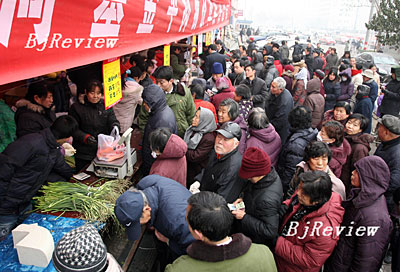| 
Price Freeze to Curb Inflation
The price of gasoline, natural gas, electricity, water, heating and urban public transport fees, scenic spot ticket charges and school tuition will be frozen in the near future amid public concern about inflation, according to a statement from China's National Development and Reform Commission (NDRC), the country's economic planner.
The same statement said, "The country will give further support to the agricultural sector this year, increase the supply of agricultural products and give full play to both domestic and international market resources to stabilize prices." Temporary price control measures have been exerted on a package of products, including grain, edible oil, meat, milk, eggs and liquefied petroleum gas.
Patent Clout
China received more than 153,000 domestic invention patent applications in 2007, up 25 percent over 2006, said Director of the State Intellectual Property Office (SIPO) Tian Lipu. He said foreign invention patent applications reached 92,000 in 2007, up 4.5 percent over the previous year.
"Domestic patent applications for inventions accounted for 62.4 percent of total invention patent applications accepted by SIPO in 2007," Tian said at an annual meeting of SIPO. The ratio between domestic and foreign patent applications for inventions was four to six in the early 1990s and half-and-half in 2003.
"It indicates that China's self-innovation capability is increasing and the quality of domestic patent applications is improving," Tian said.
Banking Market Innovation
China will expand trading of interest-rate swaps in February to accelerate the development of derivatives and help companies and financial institutions hedge risks, the central bank said.
Qualified members of the nation's interbank bond market will be allowed to trade yuan-denominated interest-rate swaps, the People's Bank of China announced on its website.
The plan will be effective 30 days from January 18, the bank said. China first allowed commercial banks to trade interest-rate swaps under a pilot program in early 2006, as Shanghai Daily quoted Bloomberg News.
Such transactions enable parties to exchange fixed-rate payments with floating-rate payments and vice versa to hedge risk.
Temporary Ban on Coal Exports
China's Transport Ministry ordered ports to temporarily stop loading coal for export as the country struggles to meet domestic needs amid mounting power shortages due to snowstorms sweeping southern provinces.
The Transport Ministry's emergency notice, posted on its website, ordered railways and other transport networks to make hauling coal and food a priority over the coming weeks. Ocean shippers should stop loading coal for export and divert shipments, if needed, "for domestic thermal coal requirements," it said.
It warned of "severe" consequences for failing to comply with the order, to stay in effect through the Lunar New Year holiday in February.
Blacklist of Discredited Executives
Executives of Chinese listed companies who break securities laws will find themselves on a credit blacklist, the China Securities Regulatory Commission (CSRC) has warned.
The CSRC will set up a credit database for online inquiries and statistical analyses, to create an orderly and transparent capital market, said a CSRC source.
The CSRC will link the database with the nationwide credit system in the future. The 987 people punished by the CSRC in the past four years for breaking securities laws and regulations, most of them executives in listed companies, are likely to be the first group on the blacklist. So far, the commission has deprived 165 speculators of access to the market. | 